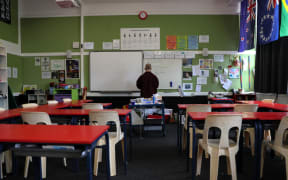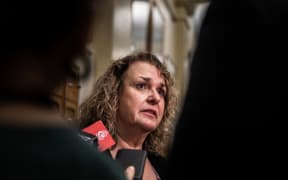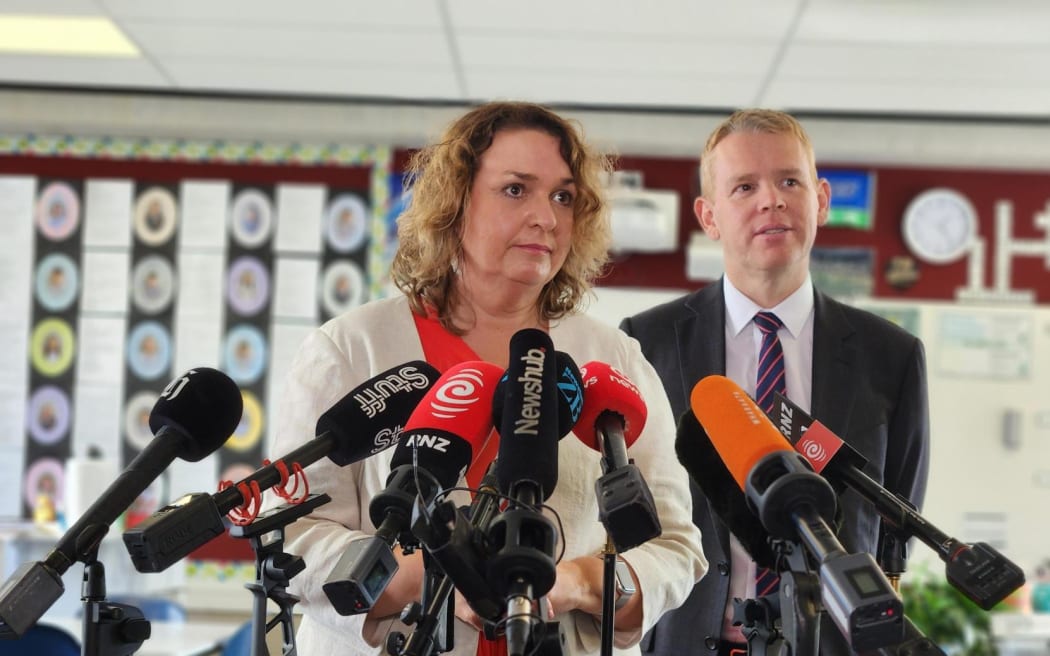
Chris Hipkins and Jan Tinetti - the former and present minister of education. Photo: RNZ / Finn Blackwell
Under the current government, schools have ditched decile numbers, coped with a pandemic and started to get to grips with NCEA and curriculum changes.
With the general election just over a month away, RNZ asked school principals what impact nearly three years of Labour government have had on their schools.
At Silverstream School in Wellington's Hutt Valley, principal Lorraine Taylor said she was not happy.
"We feel quite abandoned actually. I think that schools have been left to their own devices and there's really been a complete vacuum in leadership from the Ministry of Education or from the minister.

Lorraine Taylor. Photo: RNZ / John Gerritsen
"We've got a curriculum refresh that's not a curriculum refresh at all, it's a complete curriculum rewrite that masquerades as a refresh. Schools just feel like they've been let down. There's been little to no support for kids with additional needs, while the Ministry of Education staffing is just ballooning."
Taylor said she did not believe Covid-19 had stopped the government from giving schools more support.
"I think that's a really handy excuse. I think there's a lot more they could have done. We feel a bit abandoned and really disappointed."
Porirua College principal Ragne Maxwell was more positive.
She said the government had taken on a lot in the past three years, and the free school lunch scheme - begun in the final year of the Labour-New Zealand First coalition and expanded by the current government - had been especially good for her school.
"The single biggest shift for our students has been the free school lunches," she said.
"We have a huge wealth gap in this society and I think a lot of people aren't aware how bleak and bitter it is for people at the lower end of it. People do not have enough to eat."
Maxwell said it was hard to measure the effect on student achievement because many factors affected learning, but the lunches had greatly improved attendance and students' learning was better too.
"If you go round and talk to students and teachers in this school there is no doubt whatsoever this is making a significant difference to learning."
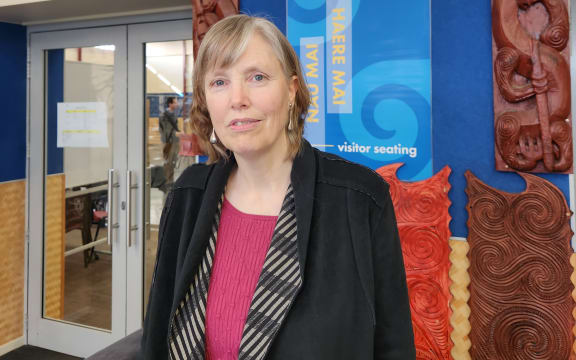
Porirua College principal Ragne Maxwell. Photo: Supplied
Maxwell said she was excited about the way NCEA and curriculum changes were putting Te Tiriti o Waitangi at the centre of learning.
"We're interested in exploring what that looks like in terms of locally based education and educating Māori as Māori and all of our students within their cultures, while at the same time educating them to be part of a bicultural Aotearoa."
Maxwell said Covid-19 had slowed the government's work, and she felt there was too much of a rush to get things done.
Secondary Principals Association president Vaughan Couillault said the Labour and Labour-led governments had big plans for NCEA and the curriculum, but Covid-19 threw a spanner in the works.
"The real story of the last four or five years has to have been Covid and emergency management, and what that has done to disrupt the state of secondary education and upset the flow of any of those changes and updates to the point where they've become quite difficult to implement," he said.
"Whatever they tried to start in their first term they haven't been able to get over the line. You could argue it was their fault or not, but with all of the Covid interruptions and then the resultant workforce issues and inflationary pressures, things have been far more challenging than perhaps we anticipated they might be in 2017 or 2018."
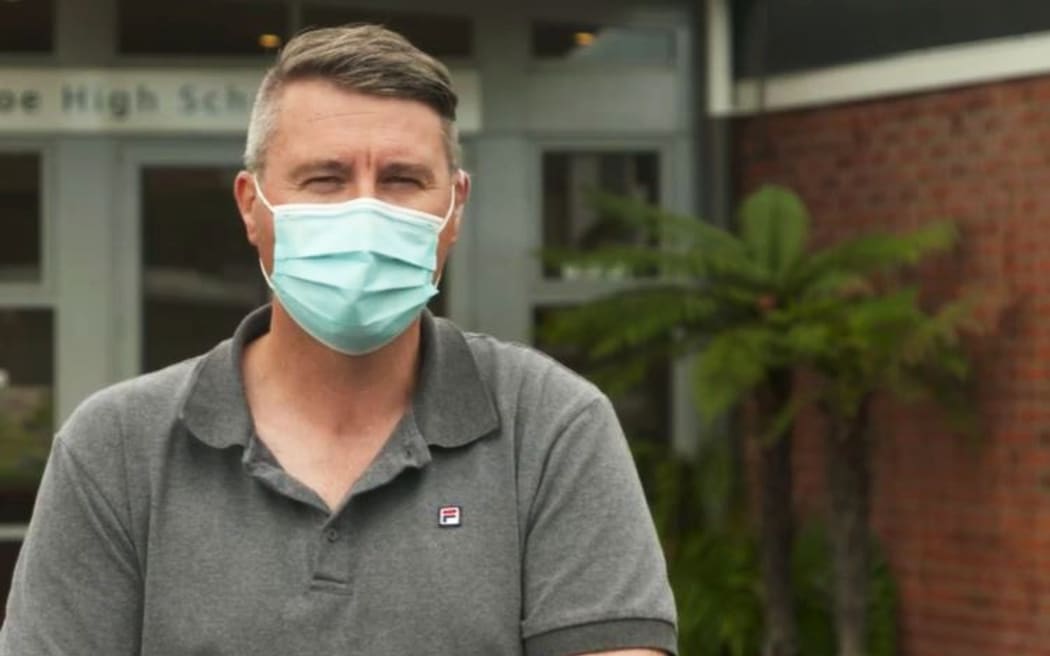
Photo: RNZ
As for the Covid-19 response itself, Couillault said the Ministry of Education did a great job keeping schools informed through lockdowns, but the vaccine mandate for teachers caused significant problems, only to be rescinded after five months.
He said his school benefited from the school lunch scheme and from the donation scheme that paid schools for agreeing not to ask families for donations.
Te Akatea president Bruce Jepsen said Māori principals were pleased the government had introduced policies that raised the status of the Treaty of Waitangi and Māori language in the curriculum and in classrooms.
"Te Mātaiaho is the refresh of the New Zealand Curriculum, which emphasises Te Tiriti. The second one I want to acknowledge is Aotearoa New Zealand Histories, which emphasises New Zealand history and New Zealand Māori history, and the other significant policy is Te Ahu o te reo Māori which prioritises Māori language.
"It's a really positive start, yet there's plenty of work to do. But I do acknowledge the government for making this positive start. They are explicit examples of progress we're making toward a more Tiriti-activated education system."
Former school principal and Qualifications Authority deputy chief executive Bali Haque led a major review of the school system for the Labour-New Zealand First government, which adopted some of its recommendations in a watered-down form and some were still being bedded in.
He gave the government some leeway because of Covid-19, but said overall he was disappointed.

The chairperson of the Tomorrow's Schools review taskforce Bali Haque. A system that generates winners and losers is not acceptable. Photo: RNZ Insight/John Gerritsen
"There are a number of good things happening around the country, things like school lunches, I think there's more money going into equity funding. But unfortunately my conclusion is it's sort of a 'not-achieved' in terms of addressing the big, gnarly issues we've been trying to address.
"We've got an atomised education system with 2500 boards, many of whom really are not capable of doing what we're asking them to do. And that's the nub of it really. We've bought into this system which is not really working and we need to provide more support to teachers and principals and boards to do the job that we ask them to do, and we probably need to reduce the load on them. I think that's absolutely key."
He said the problems facing schools were not the Labour government's fault, and successive governments had failed to resolve significant disparities in student achievement over the past 30 years.
Haque said neither major party appeared to have policies that would achieve more than tinkering at the edges of the school system.
"I think school lunches has been a fantastic success story. I think the move to equity funding - where schools are getting funded more accurately in terms of their need - I think that's a great move forward.
"There's been building projects, even things like the curriculum refresh are welcomed, but it's really how it pans out, how it impacts on the classroom and the teaching and learning that I'm interested in, and my fear is it's surface stuff and it doesn't get to the deep roots of our issues."

